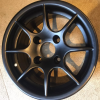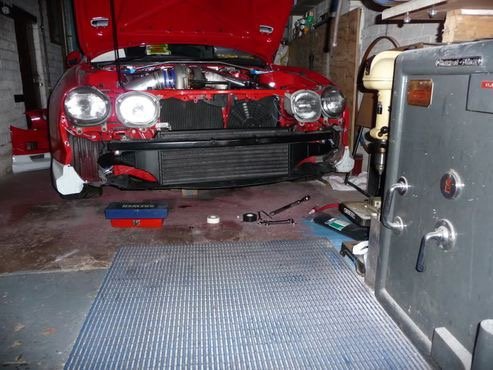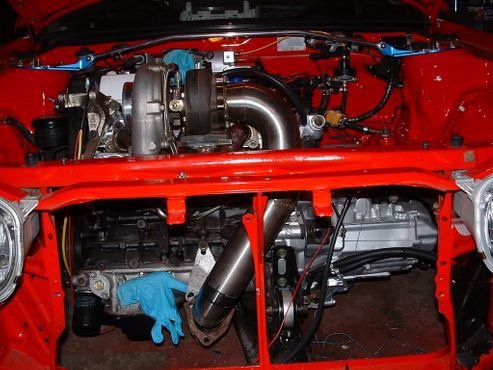-
Posts
345 -
Joined
-
Last visited
-
Days Won
10
Content Type
Profiles
Forums
Events
Store
Community Map
Posts posted by Mrbarry
-
-
It’s colour unless you live in America. That said my spelling is atrocious as a rule.
-
Does it seem to fail after turning right, left, indiscriminately? Could possibly 50/50 the fault finding there.
-
Blue and black are the ends of a wire wound resistor. The third yellow wire is connected to a wiper than literally ‘wipes’ a carbon pad across the windings as it’s rotated to give a percentage reference/feedback to the ecu. Swapping the black and blue will change the polarity and is most likely rectify the problem as already pointed out.
-
 1
1
-
-
If you have an emerald ecu or similar you can use that to pull in a rad fan relay. Not only can you specify the exact turn on temperature that way but you can set the hysteresis to your own spec. Might sound overkill but it’s infinitely adjustable at the push of a button if you decide it’s running too hot or cool.
-
-
Japan black for maximum heat transfer
Core tube size should match the indernal pipe diameter perfectly in cross sectional area orbit creates compression and heat. Out going pipe work to the turbo 15-20% larger CSA to decompress slightly and swamp cool further. Length of core as long as possible. A 7 nose cone is the worst shape in the world for an intercooler tho. A charge cooker would be more fitting on a 7 car.
That at was a £7K install and I did all of the welding and fabrication at home. Parts are not cheap if you go for the best results. The exhaust manifold was over £3k alone.
I used to love working on cars, if only I had the time I used to have to play.
I still have the flow print outs at home. Miss that car!
For reference if anyone is interested the turbo is a Garrett GTX3076R and ran 2.4 bar boost on Sunoco fuel. Went like a rocket!
Adrian Smith at Fensport mapped it. He is the best mapper I’ve ever met but only does Motec and now some other brand. Shame he doesn’t do Emmerald!
-
-
-
I have fitted turbos to tens of cars, a few for my self and a lot for friends.
Parts list would look like this:
Turbo and actuator
exhaust manifold or adapter to turbo
Exhaust header to turbo
Air filter ideally fed from outside of the engine bay
oil lines, feed and return
water lines, feed and return
some vacuum and pressure lines for boost control, EBC if you desire, or a VSV switched on a duty cycle via the ecu
intercooler/chargecooler if you run over 7psi boost and a BOV/Dump valve, recirculating if you have a MAF, recirculating or atmospheric if you go MAP
Intercooler pipe work and clamps, V band clamps if the wallet allows with Mikalor clamps on the flexi hoses to decouple it from the engine movement. All Mikalor clamps if not V band
A MAP sensor ideally over MAF to control fueling.
Bigger injectors or a fifth injector on boost.
A plenumn chamber is the usual choose over throttle bodies if you have those, ITBs take boost incredibly well but it’s harder to manufacture parts and tune trumpet lengths, room is also our enemy here.
If if you love loud noises as much as me a screamer pipe is glorious. You can use a separate silencer like the Ferrari F40 or raw noise to the ears
 Some people have valves to switch between screamer and recirculating.
Some people have valves to switch between screamer and recirculating.
Tou will obviously need time, tools, fasteners, fabrication skills.
-
 1
1
-
-
Was a good turn out today! Doubled the miles on my car in one day lol. Was 170 miles this morning, 347 now. Went like a dream both ways.
Thank to GBS for a great day, and to Steve for sorting my exhaust packing and sleeve.
-
Sorry I wouldn’t sell just the cover.
-
Well as an electrical engineer with three decades of experience in industry I’ve yet to have an insulated crimp fail that hasn’t been overloaded or subject to some sort interference. Must have made 20,000 of them off. That said we don’t use eBay crimps we have branded ones. You need to be sure you fill the lug too so the crimping process can remove all of the air from the joint preventing movement and high resistance. They are more bulky than naked lugs but make a lower resistance joint.
-
ratchet crimpers are ideal. Even a cheap set like these give a measured compression.
Colours are red for up to 1.5mm cable, blue for 2.5 and yellow for 4 and 6mm. You’re into tube lugs 10mm and beyond. I have a couple of sets of crimpers for up to 300mm cables if anyone needs to use a pair. They are much more costly, especially the hydraulic set.
-
Just as dangerous, it’s just not something they test for.
Let's say that car park fire last year was started by a kit with poor wiring, and the investigation pointed to it. Do you think there would have been no come back then? We are all liable for our actions.
As for bad wiring causing understeer? If you get a fire at 70mph and panic hitting a parked or oncoming car... it’s entirely possible. More likely you will just end up with a brake down, or a fire in the car at worst, that doesn’t excuse bad practice.
They didnt used used to mind you driving after 11 pints, you used to be able to text and drive. I think we all agree they are both bang out of order these days. IVA makes sure that we don’t have brake hoses rubbing on a wheel, that the wheels are held on with enough bolts and that the seat belts are safely fixed.... there is a limit to what they can test in a sensible world. I maintain that people who fit crimps with a pair of pliers are asking for trouble and should invest in the correct tools for the job, £10 off eBay isn’t anyone’s life savings surely.
-
 1
1
-
-
Maybe so, but if you crimp with pliers it’s in the same league as driving on bald tyres. When it all goes wrong there will be tears and then they blame someone else.
-
Crimping is something you learn. Same as soldering correctly. It’s something you’re taught more to the point. You do gain a feel for it with experience.
Soldering and brazing is the only way in some situations, crimping in others. You wouldn’t crimp a 295mm cable in an 11kv motor, or even a 35mm in a 110v motor. But underground cables are crimped and insulated in resin torpedos as fat as your leg. There’s a bit of science to getting the right joint.
On a kit car it’s more important to reduce movement and flex of the joint than how you make it.
And if you crimp with pliers or a vice you deserve a car fire!
-
All of the text books insist crimping is better than soldering, soldering just feels like it should be better in the mind. I like to solder but you gotta make sure you don’t overheat, if solder travels into the insulation that’s where it gets most problematic. I still only solder where there is zero flexibility in the loom tho. Pros for soldering, reduces risk of oxidisation, cheaper, smaller. Cons, risk of heat damage, can be brittle, more time consuming.
-
Exactly that. Mass production has made micro processors so cheap and common place you get them everywhere.
As ive probably posted I’m an electrical engineer and have dealt with a huge array of kit in my 27 years in the field, it is constantly changing and developing. It’s so cheap and easy for a company pluck a programmable integrates circuit off the shelf to do whatever you need these days. Electronics I don’t do, but I have an appreciation of the subject as you would imagine. Few people appreciate the size of the field that is electrical control, each area has specialists and experts.
I do know smiths, like many others, use a single board and simply swap the face, bezel, fingers, etc, then program the thing to do as they wish. Stepper motors are precise and efficient and it makes perfect sense. They could make any custom gauge you like from this single base. That’s not to say all of their gauges are identical they do make none stepper motor ones but again minimising parts and sharing enables even more bulk buying power for them. It just makes sense. And ICs can be powerful now, even tiny ones can carry massive processing power with all sorts of custom algorithms built in right from the factory.
-
Had an email from smiths today. They said send the gauge in and they will mod the software on it to add dampening. The fuel gauge should be dampened but apparently sometimes they assign none dampened software to them. It could be £25 but if it turns out it has the none dampened software (it does) it will be a free alteration.
Either way they can sort it with no need to add extra parts or alter a thing. Peter the software engineer was very helpful tbf.
-
 1
1
-
-
Full set of wet weather gear for a GT including hinges, doors, boot cover, frame, brackets. Brand new never opened.
Im looking for £500 a saving of £148
-
I see what you meant about the Y and the I. You may as well have put a big red ‘do not push’ button in front of me

-
we crosses posts nicely there they seem a good company. I’ll do a bit of pondering for now but that would make life easy
I have thought about adding a damper weight around the pivot point of the arm in tank. Significantly raising the moment of inertia wouldn’t allow the float arm to move rapidly, but it would still move freely. It would need to be finely balanced and centred to avoid misreading tho.
-
I called smiths they insist it’s how it should behave and would need external suppression. It’s little more than a seesaw with electrons really, I’ve found a company who sell a solution but at £50 I’ll put up with it as it is haha.
-
Regulation wouldn’t help but thanks for the idea. It’s not a voltage problem it’s a fuel level going up and down like an yo-yo problem. There are numerous mechanical methods of fixing the problem but it’s more trouble than it’s worth. Don’t spend a pound to save a penny sort of a thing.
I want to try a hand full of simple ideas and will let you know the outcome.
I think ultimately I’ll end up decoupling the feedback via some sort of sampling circuit, just hoped that someone would say ‘‘yeah but this for £10 off eBay and you’re done’’.














Rust cleaner/anti rust paint
in Maintenance & Modifications
Posted
Fair enough then

At least brexit isn’t an issue over there lol.